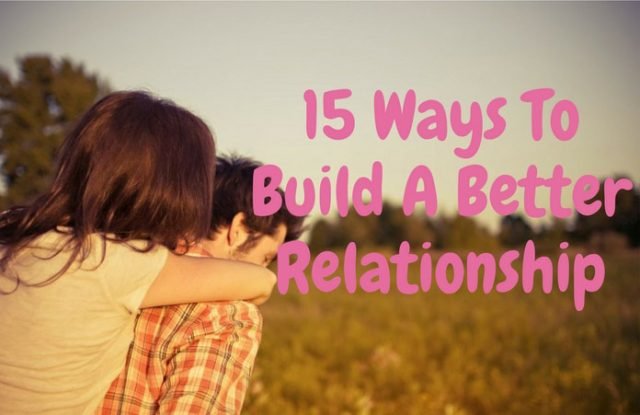Whatever be the sphere of personal life you are involved in, relationships end up being pivotal to your success. When you talk about the personal realm, relationships with your spouse, parents, siblings, relatives and friends are all important. There are relationships that are maintained on a personal basis with numerous other people. While some methods and techniques would work well for various types of relationships, there are others which would be applicable only in specific contexts.
Here are 15 ways to build a good relationship in various spheres of life.
Be an excellent listener
Listening is a low-profile, underrated, yet key skill needed to build better relationships. It is applicable to all kinds of situations. Consider the case where you have to build a better relationship with your spouse. While the ability to speak well and communicate one’s ideas is important, it is equally important to be a good listener. By being a good listener, we are demonstrating our commitment to the other’s person’s priorities. Some of the key elements of being a good listener include:
- Focusing fully on what is being talked about
- Being proactive in terms of asking about where they see problems
- Being patient and consistent in terms of listening to all of what is being talked about
Employ empathy
There is no substitute for real empathy while building better relationships. A true sense of empathy allows you to put yourself in the other person’s shoes while reading a particular situation. When one has a good sense of empathy, one invariably finds greater ease in building relationships. Empathy influences all aspects of your interaction ranging from asking questions to listening. For instance, consider the below:
A person is coming to you, claiming that something seriously wrong has occurred. Empathy allows you to listen fully to what the person is saying, instead of disregarding many parts because they don’t appeal to your own sense of what can be and what cannot be.
When asking questions, empathy allows you to go deeper and ask more relevant questions which go to the core of what is being talked about.
By asking good questions
The person talking to you will open up to you on the basis of how comfortable they feel with you. That kind of comfort comes with the realisation that you are sincere in asking your questions. Good questioning utilizes follow up questions. For instance, consider the below scenario.
Suppose there is a person who has come to you with a serious problem centered around one of your statements to a family member. Some good follow up questions could be “can you describe for me, when it actually occurred” or “tell me more about it.”
Pay attention to body language
Body language is a form of non-verbal communication that is among the most valuable sources of input when we are listening to a person.
When a person is speaking to you, do ensure that you are paying attention to the person’s body language and facial expressions.
For instance, some types of body language can clearly mark out to you that the person is not opening up to you because he believes from past experience that his concerns would be heard but not addressed. It is very important to keep your eyes open for such situations and handle them accordingly.
Remember past conversations
One aspect that many of us fail to take care of is that it is important to keep track of critical points from past conversations.
Even in informal contexts, you would still need to keep track of key things that were mentioned in previous conversations. This sort of action has the ability to increase the trust that another person places in you. And, not keeping a track of this kind of information can lead to a breach of trust of the other person. So, it pays to not be casual about disregarding prior conversations.
Information on the finger-tips
There are some pieces of information from past interactions that you would need to have on your finger-tips. Consider for instance, the below situation. Your wife has spoken to you before that your lack of participation in housework is putting too much of a load on her. In particular, she expressed her frustration that you were not helping with folding clothes and doing the dishes.
In such a scenario, it has already been made clear as to where the spouse thinks that you should be contributing but are not. In such a case, if you are discussing this issue, your spouse would expect that you remember which specific activities your spouse had wanted your involvement in. If you are going to be asking again, “Oh, but where can I exactly help?”, it would reflect poorly on your commitment and listening skills.
Be consistent in terms of your emotional levels
It is important to maintain a certain level of mental stability in your relationships. It is true that you may be having a bad day owing to specific reasons, but such days should be few and far in between. When you are able to maintain a certain level of constancy in your mood, your credibility goes up. Sometimes, it may even be a good idea to be transparent with your acquaintance about your personal issues if they are putting you on an emotional roller coaster.
By and large, be open and transparent
Openness and transparency are two aspects that are essential in order for you to be seen as credible. However, there are some interesting dimensions to it. Being open and transparent with regards to all aspects could likely end up irritating your acquaintances. It is important to understand when to be fully transparent and when to be an intelligently moderated version of being open. This comes with experience. Sharing personal experiences that another person went through can be a powerful way of connecting to others with whom personal relationships are to be maintained.
Be genuine
One important aspect which many of us fail to acknowledge is the fact that one should be genuine during any dealings with personal contacts. While sharing experiences is a great way to build relationships, it is left unsaid that the sharing must be genuine and not be a story telling experience of some sort. It is the genuineness of your conversation that is going to build credibility with your contact and help to build healthy relationships. Even otherwise, the way you connect to the person must be genuine in general.
Be confident and comfortable in your own skin
These two aspects are related to each other. It is very important that you are comfortable in your own skin and confident. People are comfortable only when dealing with individuals who are confident and comfortable. Confidence does not mean arrogance or taking people for granted kind of attitude. Confidence simply means that you are sure of what you are talking about and the approach you are taking. In essence, it means that you are sure of what you know and how you talk about it. Without being comfortable in your own skin, you will not be able to be confident.
Be humble yet assertive
This is not a balance that is easy to achieve. Yet, it is very much needed. When you are humble, you stay away from boasting and showboating. You thus leave yourself open to the prospect of acting upon some new information. Humility also means that you are also willing to accept your mistakes. Being assertive means that you are clear about the facts that you are stating in a very matter of fact kind of way. You are clear about the position you are speaking from while still being open to any new information that people will share. This is particularly challenging in personal contexts such as where you are looking to improve your relationship with your mom.
Be positive
Always keep up a positive attitude. Positive people focus on problem solving rather than finger pointing. Such people are thus able to deal even with extremely problematic scenarios. Positivity comes out of the confidence in one’s abilities and from prior experience resolving interpersonal relationship issues. Positive people focus on teamwork to sort out issues rather than settle on a blame game. They are thus able to work with their acquaintances to resolve relationship issues. Positive people are also by nature better listeners and more forward looking.
Be large hearted
In order to build a better relationship, you should cultivate the nature of being large hearted. What this means is that when things have gone wrong not necessarily on your side, you still have ability to forgive and forget to move on. Despite the best intentions and efforts, failures are still going to happen on the other side on occasion. It is important that you take the tack of forgiving and forgetting mistakes from the other side if they are not grave. This kind of give and take gives relationships great resilience and strength.
Emphasize on open communication channels
Better communication in a relationship is critical. Nothing quite does as much for a relationship as open communication channels. Always keep the communication channels open under any circumstance. By doing so, you are ensuring that trust endures in virtually all kinds of circumstances. This makes problem solving easier when issues arise. Communication channels span face to face communications, phone, email and messaging. While messaging in a contemporary sense, is the most popular form, it is important to give enough time for face to face and phone messaging also. Email is only well suited for facts and information oriented aspects.
Whereas it is critical to have face to face and phone messaging in order to build a good connect with your acquaintances. Both face to face and phone messaging have the ability to help build deeper relationships.
Have the sense of a doer around you, and not a complainer
This is one aspect that is somewhat underappreciated as far as relationships go. A person with a sense of a doer is generally able to manage relationships much better than one with the sense of a complainer. A person with a sense of a doer generally maintains and builds relationships proactively. She also is able to switch to problem solving mode when issues arise. A person with the sense of a complainer, on the other hand is fairly ineffective in terms of building and maintaining relationships. Such a person is also unable to switch to problem solving mode when the need arises.
Do things together
Try to arrange schedules in such a manner that you are indulging in group activities together with your partner. Activities bring people together in a manner that bonding greatly improves and there is a greater sense of the collective. Such activities are extremely healthy for improving the quality of relationships.

































